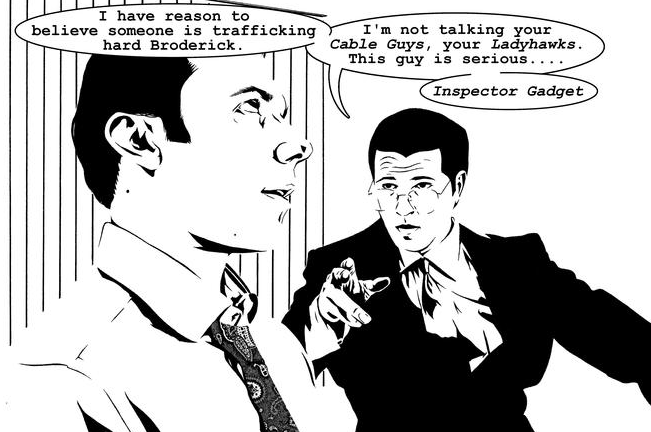The entire raison d'etre of Joseph Cappellazzi's VHS: London seems based on a pun. A fellow with long hair is walking through a dark alley and meeting a guy in a ball cap. "Candy," says the sketchy character after accepting money for something called Spaceballs. The long-haired guy is after something a little more high grade, though. "Speed," he says. The guy in the ball cap retrieves a wrapped package. The long-haired guy unwraps ... and it's a VHS tape of the movie Speed 2: Cruise Control! Oh, man, that's some cutting-edge humor I haven't seen since Weird Al Yankovic's "White and Nerdy" video!
To be fair to Cappellazzi, this isn't the first time a sci-fi story has stretched out a single pun longer than you'd expect. Think back to your high school days: Chances are you read Fahrenheit 451, which asked the reader to consider a world where, instead of putting out fires, firemen were actually setting things alight. Did Ray Bradbury just blow your mind? Unsurprisingly, VHS: London also contains shades of that sci-fi classic.
In this world, VHS tapes are considered contraband on the level of illicit drugs. Police are tasked with finding and imprisoning anyone who illegally distribute titles like Entrapment, Jingle All the Way, and Hot Shots: Part Deux! Addicts eagerly watch shows furtively from televisions and VCRs stashed in secret compartments around their houses. Wide grins of bliss spread across their faces as scenes from cheesy Hollywood movies dance across their screens.
This opens a whole succession of questions. Is it just "bad" movies that are illegal? If so, who decided what's bad and what's not? Or are all movies considered illegal, like the books in Fahrenheit 451? I suspect it's the latter. There's are panels in the comic where we discover that Hugh Grant and Gwyneth Paltrow are considered political fugitives, and those two have been in their share of good movies. If that were the case, what happened in society to cause people to turn against entertainment?
While we're at it, why VHS? Why not DVDs or some sort of digital format? Maybe it's just some sort of hipster affectation. But perhaps all other formats had been successfully destroyed, and VHS tapes are the ones remaining? So many questions unanswered in Episode 1. Cappellazzi is conducting a Kickstarter to raise funds for Episode 2, which hopefully will flesh out some of the more tantalizing threads.
The premise is undeniably a goofy one, where selling The Postman to 16-year-olds is portrayed as a heinous crime. (In-universe, it's never seen as ridiculous. The webcomic feels like an episode of Law & Order rendered in inks reminiscent of Frank Miller's noir comics.) It does make you think, though. Protecting the populace from potentially harmful habits has always been a hot topic when it comes to law and order. Prohibition, for example, was based on good intentions, with alcoholism remaining a destructive influence on people's lives. But to what extent does the law interfere with the private lives of those who use these banned items responsibly? It makes you wonder about our current laws that we might take for granted as common sense these days but, in some other time or some other society, may be considered as ridiculous as banning VHS tapes of cheesy movies.

